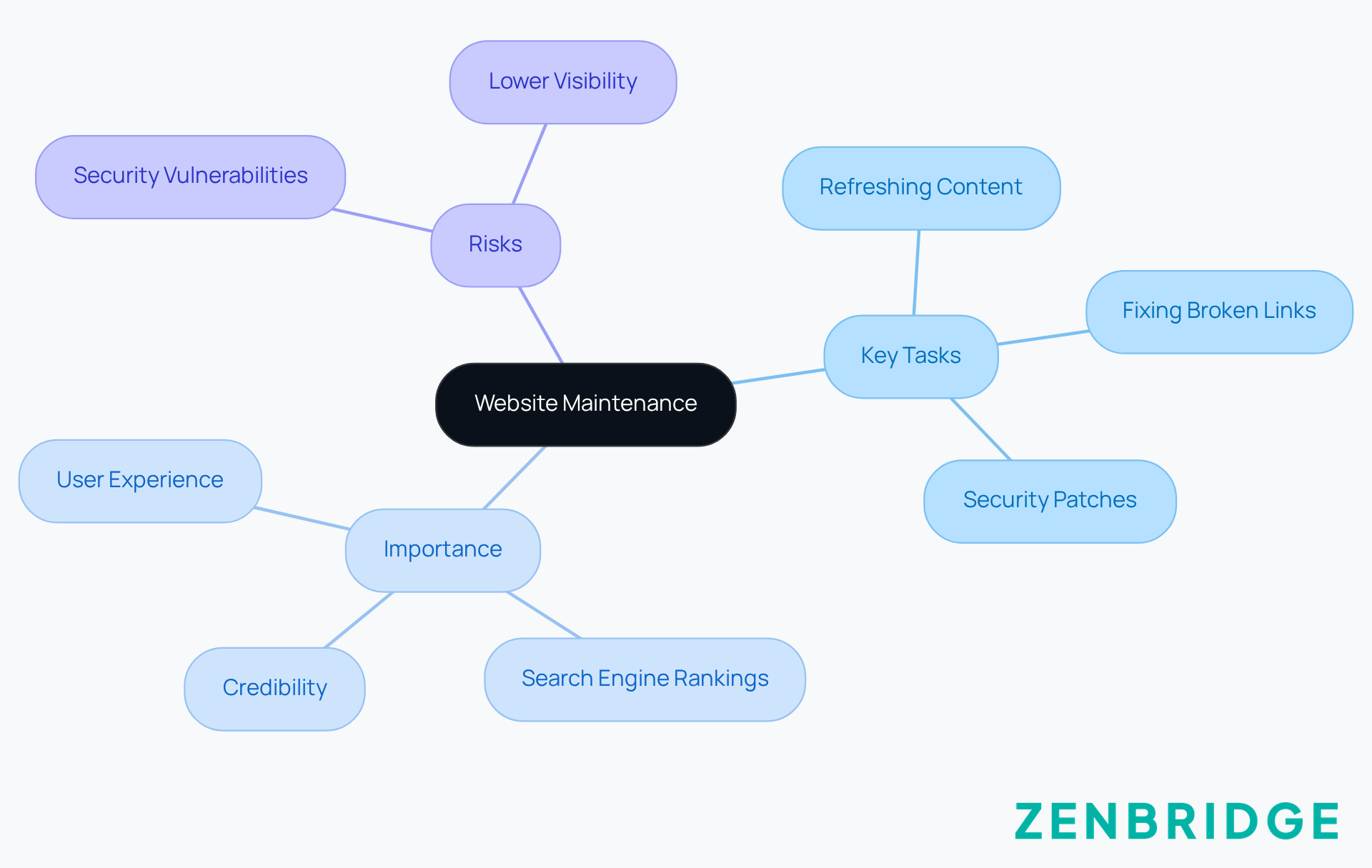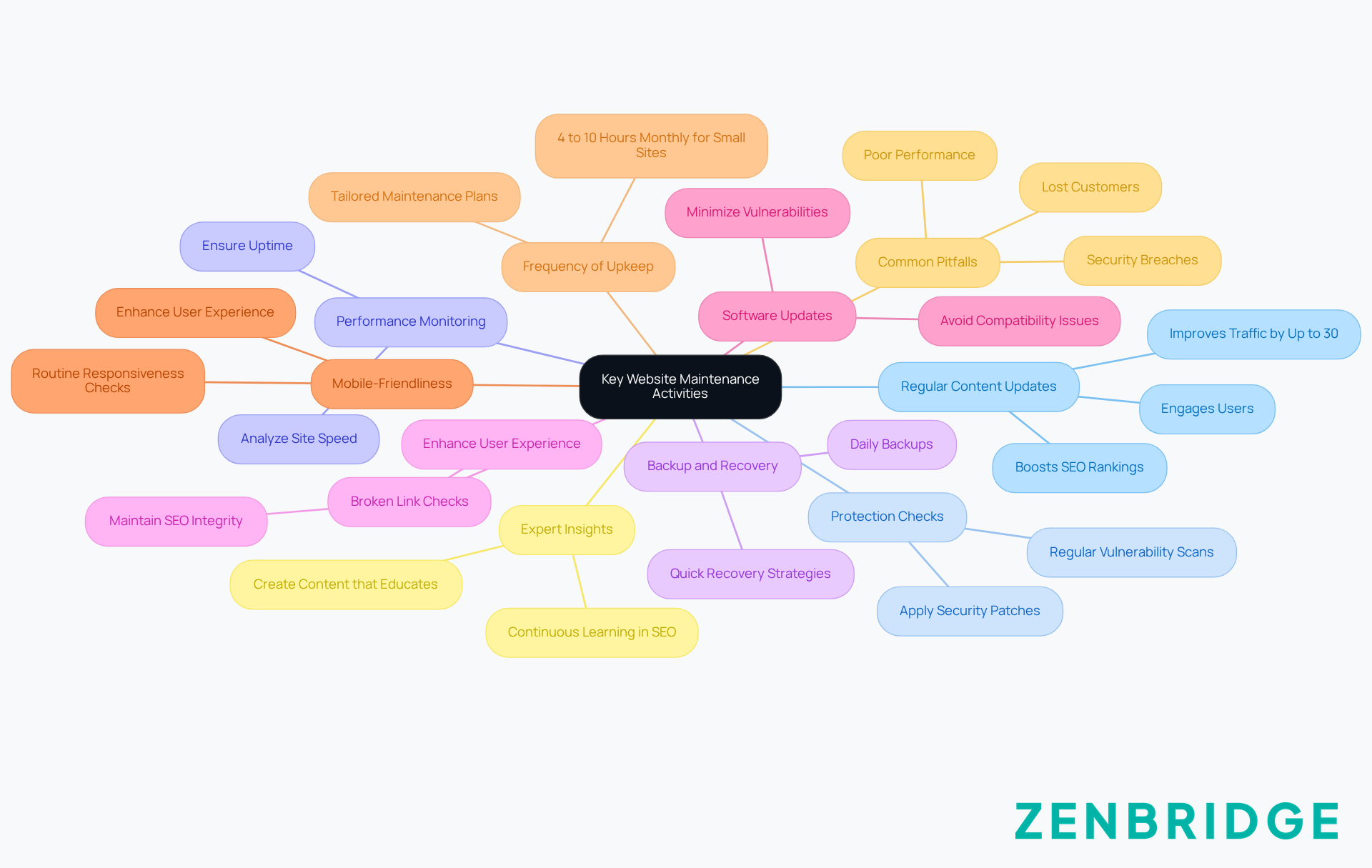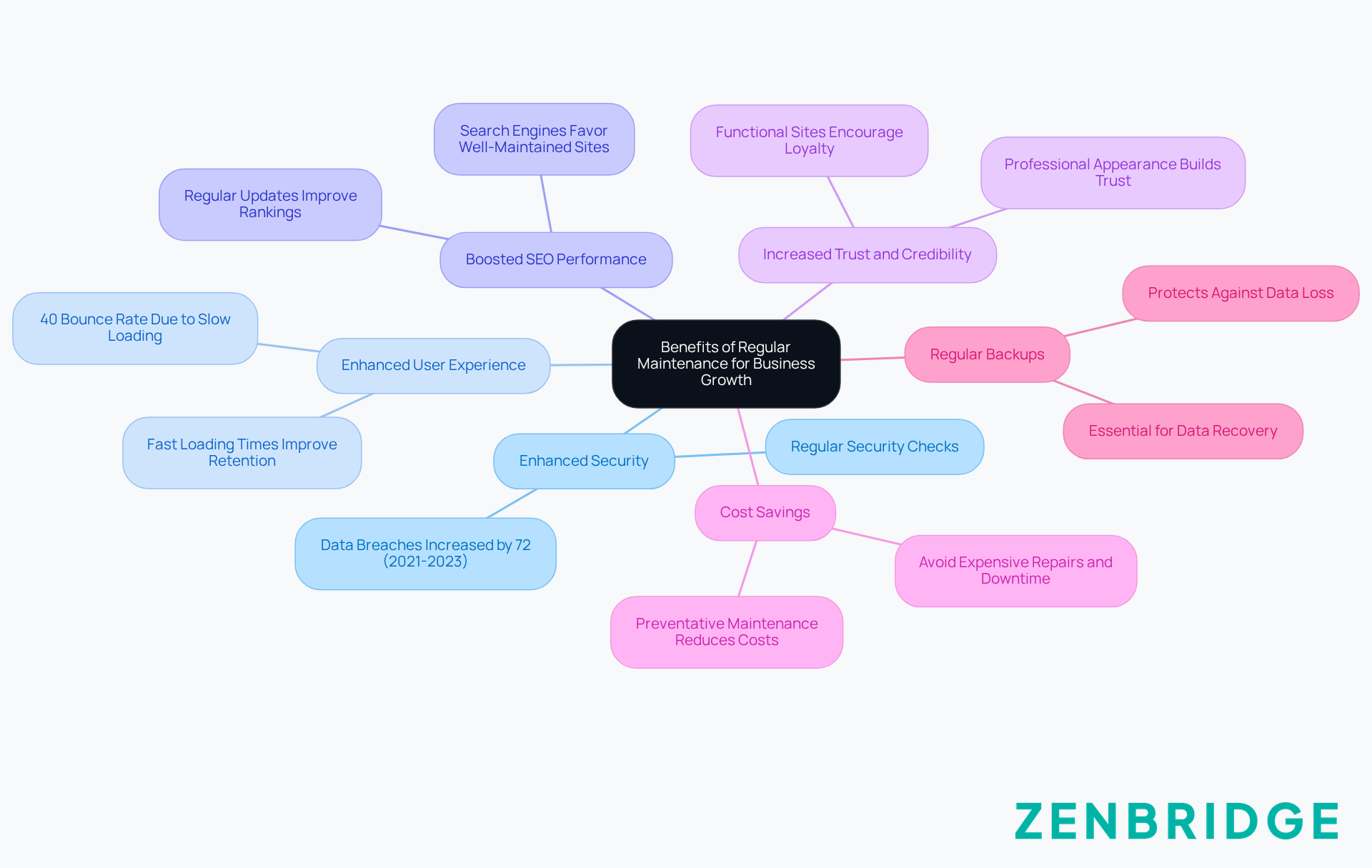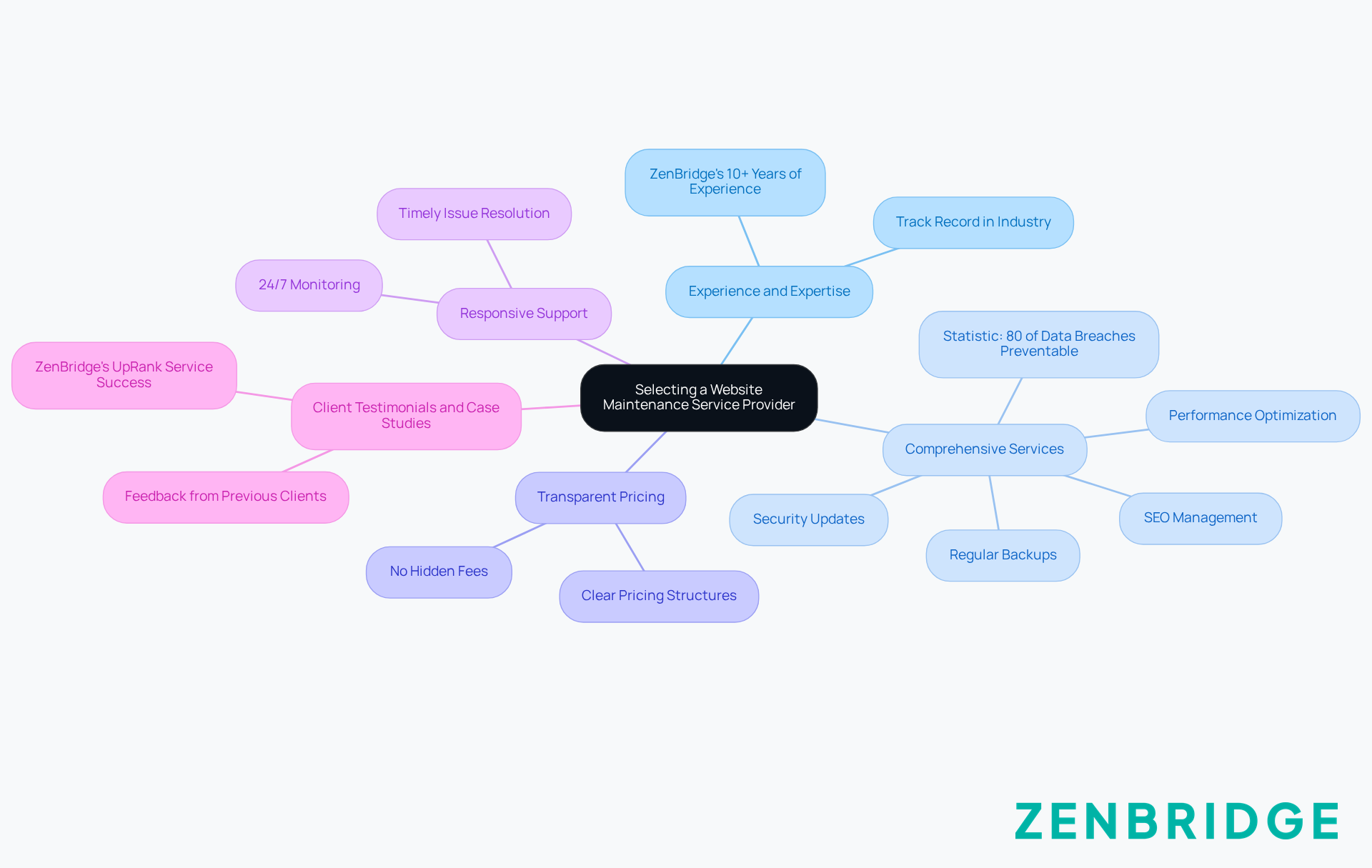
4 Essential Practices for Web Maintenance and Support

Key Highlights:
- Website maintenance involves ongoing tasks such as content updates, fixing broken links, and applying security patches to ensure optimal performance and safety.
- Consistent maintenance enhances user experience, improves search engine rankings, and builds credibility, potentially attracting up to 40% more visitors.
- Ignoring website upkeep can lead to serious risks, including security vulnerabilities and decreased visibility in search results.
- Key maintenance activities include regular content updates, protection checks, performance monitoring, backups, and ensuring mobile-friendliness.
- Regular updates can improve site traffic by up to 30% and enhance security, reducing the risk of data breaches, which increased by 72% from 2021 to 2023.
- A well-maintained website fosters user trust and can lead to increased customer engagement and loyalty.
- When selecting a maintenance provider, consider their experience, range of services, transparent pricing, responsive support, and client testimonials.
Introduction
In today’s digital world, having a well-maintained website isn’t just a nice-to-have; it’s essential for businesses that want to thrive. Regular web maintenance and support are key to keeping your online platform secure, user-friendly, and optimised for search engines. As we look ahead to 2025, the stakes are higher than ever. Ignoring these important practises could expose you to serious risks, like security vulnerabilities and a drop in online visibility.
So, what can businesses do to protect their digital presence and encourage growth in this competitive landscape? Let’s dive in and explore some strategies together!
Define Website Maintenance and Its Importance
Keeping your site in shape is an ongoing task, right? It means you need to utilise web maintenance and support to monitor, update, and optimise your online platform to ensure everything runs smoothly and stays safe. Key tasks for web maintenance and support include:
- Refreshing content
- Fixing broken links
- Rolling out those all-important security patches
Now, why is consistent online upkeep so crucial? Well, it directly impacts user experience, search engine rankings, and underscores the necessity of web maintenance and support for your organisation's credibility. A well-maintained online presence can attract up to 40% more visitors than a neglected one, which is pretty impressive! It builds trust and drives conversions.
Looking ahead to 2025, ignoring upkeep could expose businesses to serious risks, like security vulnerabilities and lower visibility in search results. For instance, a case study on the impact of regular updates revealed that consistent upkeep can lead to better search engine rankings and faster loading times.
As Tony Herman wisely said, 'An online platform without consistent upkeep is akin to a vehicle without routine care - it will ultimately fail and turn into a burden rather than a benefit.' Plus, he added that 'Frequent updates, such as protection patches and content renewals, enhance your search engine standings.' This really highlights how important it is to weave web maintenance and support into your digital strategy to fend off issues and boost your online visibility. So, what do you think? Ready to dive into some upkeep strategies?

Identify Key Website Maintenance Activities
Hey there! Let’s chat about some key website maintenance activities that can really make a difference:
-
Regular Content Updates: Keeping your content fresh and relevant is a must! It not only engages users but also gives your SEO rankings a nice boost. Did you know that regular updates can improve traffic by up to 30%? That’s essential for attracting and keeping visitors around.
-
Protection Checks: You definitely want to perform regular scans for vulnerabilities and apply those patches. Ignoring these checks can lead to cyber threats that harm your business's reputation and visibility. Yikes!
-
Performance Monitoring: Analysing your site speed and uptime is crucial for a smooth user experience. A slow-loading site can drive visitors away and impact your income. So, regular performance assessments? Totally necessary!
-
Backup and Recovery: Having a solid backup strategy is your safety net against data loss. Quick recovery is key when issues arise. Daily backups are essential to protect your online investments and keep your professional presence intact.
-
Broken Link Checks: Regularly checking for and fixing broken links is a simple way to enhance user experience and maintain your SEO integrity. Plus, it prevents those pesky penalties from search engines!
-
Software Updates: Keeping all your software, including plugins and themes, up to date helps avoid compatibility issues and vulnerabilities. Regular updates are essential for optimal performance and security, ensuring everything runs smoothly across all devices.
-
Mobile-Friendliness: With more people using mobile devices to access the web, ensuring your platform is mobile-friendly is critical. Routine checks for mobile responsiveness can enhance user experience and improve your SEO rankings.
-
Frequency of Upkeep: If you have a small online platform, you might need around four to ten hours of support each month, depending on its size and complexity. This frequency is crucial for ensuring effective web maintenance and support to keep everything running smoothly.
-
Common Pitfalls: Ignoring routine website upkeep can lead to security breaches, poor performance, lost customers, and a damaged reputation. Being aware of these pitfalls can help you avoid significant headaches down the road.
-
Expert Insights: As Neil Patel wisely says, "Create content that teaches. You can't give up. You need to be consistently awesome." This really highlights how important continuous content updates and upkeep are for boosting traffic and engagement.
So, what do you think? Got any questions or experiences to share? Let’s keep the conversation going!

Explore the Benefits of Regular Maintenance for Business Growth
Hey there! Let’s chat about why regular website maintenance is a game changer for growing your business.
First up, Enhanced Security. You know, keeping your site in tip-top shape really helps reduce the risk of data breaches and cyberattacks. With data breaches skyrocketing by 72% from 2021 to 2023, it’s super important to stay on top of your security measures to protect both your business and your customers' info.
Next, we have Enhanced User Experience. A well-maintained site loads quickly and runs smoothly, which means happier users and better retention rates. Did you know that nearly 40% of users will bounce from a site if it’s slow or glitchy? That’s a big deal when it comes to potential sales and engagement!
Now, let’s talk about Boosted SEO Performance. Regular updates and tweaks can help keep your search engine rankings solid, driving more organic traffic your way. Search engines love sites that perform well, so regular upkeep is key to improving your visibility and attracting visitors.
And don’t forget about Increased Trust and Credibility. A professional-looking, functional website builds trust with your audience, encouraging them to connect with your brand. A well-maintained site shows you care about quality, which can really impact how customers see you and their loyalty to your brand.
Then there’s Cost Savings. Preventative maintenance can save you a tonne in the long run by avoiding those pricey repairs and downtime that come from neglect. Simple tasks like software updates and security checks can help prevent issues that might lead to costly repairs or extensive downtime.
Lastly, let’s not overlook Regular Backups. Keeping up with frequent backups is crucial for getting your site back on track after an attack. This way, you won’t lose data permanently, and you can recover your platform quickly.
Looking ahead to 2025, the impact of online upkeep on business growth is huge. By investing in regular maintenance, you’re not just boosting your online presence; you’re also creating a secure, user-friendly space that encourages customer engagement and loyalty. So, don’t ignore your online platform—because the consequences can be serious, like security vulnerabilities and lower user engagement.
Got any questions or thoughts on this? I’d love to hear what you think!

Select the Right Website Maintenance Service Provider
When you're picking a website maintenance service provider, a few key things should really steer your decision-making process:
-
Experience and Expertise: First off, look for providers that have a solid track record in maintaining websites like yours, especially in your industry. Cheque out how long they've been in business and if they specialise in your field. For instance, ZenBridge Consulting has over ten years of experience and has wrapped up more than 360 projects. That's a pretty good sign they know how to deliver efficient support solutions!
-
Comprehensive Services: Make sure the provider offers a full range of upkeep services. We're talking security updates, regular backups, performance optimization, content edits, and SEO management. A complete package of web maintenance and support is key to keeping your online presence safe from vulnerabilities. Did you know that 80% of data breaches could have been avoided with timely updates?
-
Transparent Pricing: It's super important to choose a provider that lays out clear pricing structures with no hidden fees. This kind of transparency makes budget management a breeze and helps you avoid any unexpected expenses. You want to allocate your resources effectively, right?
-
Responsive Support: Look for a provider that promises timely support and communication. With many hosting services offering 24/7 monitoring, getting issues resolved quickly is essential for keeping your site running smoothly and your users happy.
-
Client Testimonials and Case Studies: Don’t forget to cheque out feedback from previous clients to gauge the provider's reliability and effectiveness. For example, ZenBridge's UpRank service has really helped businesses boost their online visibility, leading to more customer engagement and better search rankings. Plus, checking out a provider's portfolio can give you a good sense of their capabilities and past successes.
By focusing on these criteria, you can find a provider that offers web maintenance and support services, which not only meets your needs but also plays a big role in the long-term success of your online presence. So, what do you think? Ready to dive in?

Conclusion
Keeping your website up and running isn’t just a chore; it’s a promise to your users that they’ll have a smooth online experience while also protecting your digital identity. Regular web maintenance and support are super important because they directly impact user engagement, search engine rankings, and your business’s credibility. By putting in the effort for consistent upkeep, you can steer clear of potential issues that might harm your online effectiveness and reputation.
So, what are some key practises for effective web maintenance? Well, think about:
- Regular content updates
- Security checks
- Performance monitoring
- Backup strategies
Each of these plays a vital role in making the user experience better, boosting your SEO, and helping your business grow. Plus, finding the right service provider who knows their stuff and offers comprehensive services is crucial to keeping your website secure and efficient.
In a nutshell, web maintenance is more than just keeping things functional; it’s a smart investment in your business’s future. As the digital world keeps changing, making regular maintenance a priority will not only protect you from vulnerabilities but also enhance customer satisfaction and trust. So, let’s embrace these essential practises and make web maintenance a key part of your online strategy to promote growth and resilience in 2025 and beyond!
Frequently Asked Questions
What is website maintenance?
Website maintenance refers to the ongoing tasks required to monitor, update, and optimise an online platform to ensure it runs smoothly and remains secure. Key tasks include refreshing content, fixing broken links, and rolling out security patches.
Why is website maintenance important?
Consistent website maintenance is crucial because it directly impacts user experience, search engine rankings, and the credibility of an organisation. A well-maintained site can attract up to 40% more visitors compared to a neglected one, building trust and driving conversions.
What are the risks of neglecting website maintenance?
Ignoring website maintenance can expose businesses to serious risks, such as security vulnerabilities and lower visibility in search results. Regular updates are essential to avoid these issues and maintain an effective online presence.
How does website maintenance affect search engine rankings?
Regular upkeep, including frequent updates and security patches, enhances search engine standings. Consistent maintenance can lead to better search engine rankings and faster loading times, improving overall visibility.
What can happen if a website is not maintained?
A website that lacks consistent upkeep may fail to perform effectively, similar to a vehicle without routine care. This neglect can lead to a poor user experience, decreased traffic, and ultimately becoming a burden rather than a benefit.

